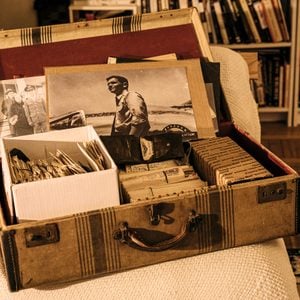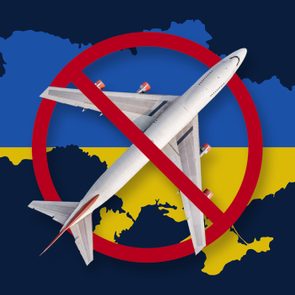How Ukraine’s Volodymyr Zelensky Is Redefining Leadership for a New World
Updated: Feb. 22, 2023
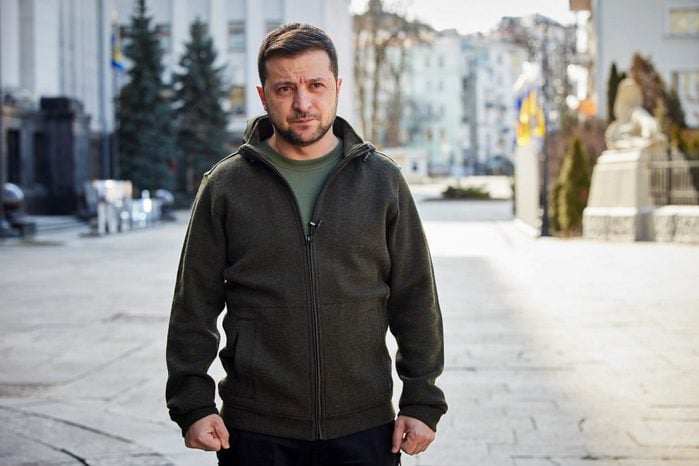
“The fight is here. I need ammunition, not a ride.”
With those 10 words, Ukrainian President Volodymyr Zelensky served notice from the earliest days of the Ukraine-Russia war that he was a different kind of leader. They came in response to an offer from the United States to evacuate him to safety after the unprovoked invasion by Russian forces. His refusal to leave told his allies in the West, and his adversary in Moscow, that he intended to stay and fight with his people.
“The President is here,” Zelensky said in a self-filmed video, surrounded by his ministers on a darkened street in Kyiv the day after it was first bombed. This proved that the Russian rumors that he had fled Ukraine and left his people to fight alone were patently false. “We are all here. Our soldiers are here. The citizens are here. And we are here. We will defend our independence—that’s how it will go. Glory to our defenders, both men and women. Glory to Ukraine.”
Zelensky has shown himself to be the leader Ukraine needs at this crucial moment in its history, even if it surprises many of the Ukrainians who voted for him. How he went from being a comedian to a modern-day Winston Churchill in just a few short years is a journey few could have predicted, but many experts say his past prepared him well for the dangerous present. In December 2022, nearly 10 months after the start of the war, Time magazine named Zelensky as its 2022 Person of the Year. And the entire world is watching as he continues to stand his ground against an army eight times the size of Ukraine’s, do his best to make sure his country remains free, and rally other nations to help Ukraine and Ukrainian refugees.
Zelensky’s unusual path to the presidency
Zelensky was born in 1978 in the southern Ukrainian city of Kryvyy Rih to a Jewish family that lost many members in the Holocaust and fighting in the Soviet Red Army against the Nazis. Like most Ukrainians, he spoke Russian growing up. He attended the Kryvyy Rih Economic Institute, graduating with a law degree in 2000.
However, a legal career was not in the cards. While in school, Zelensky fell in love with acting and founded the comedy troupe Kvartal 95, which became famous after an appearance on a popular improv competition show televised throughout the Russian-speaking world. After that, Zelensky’s acting career took off, and he often played an overmatched everyman who succeeds above his station in life and love. In 2015, his production company created Sluga Narodu, or Servant of the People. In it, he played a high school teacher whose frustrated rant against government corruption is secretly recorded by a student and then goes viral, delivering to him an unexpected (and unwanted) victory in the country’s presidential election.
A political outsider trying to make a difference
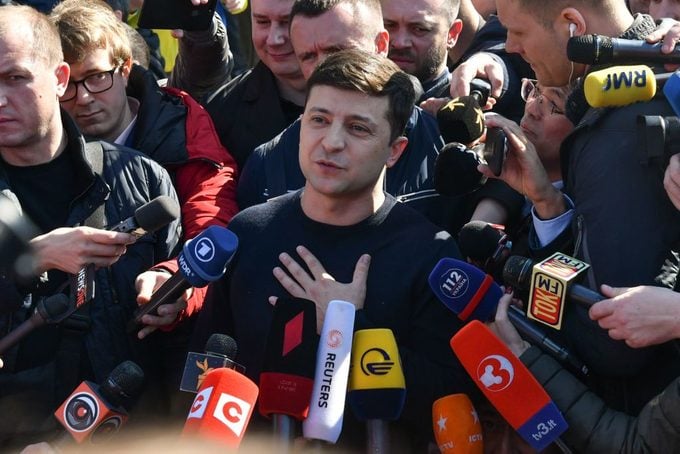
The show’s popularity, and its resonance with an audience tired of a culture of corruption that served the super rich and left the rest of the country struggling on the economic margins, inspired Zelensky to run against then-President Petro Poroshenko in 2019. Using an unorthodox campaign style—avoiding stump speeches and policy papers in favor of comedy bits and short videos posted online—Zelensky claimed the presidency with a stunning 73% of the vote.
But that wasn’t necessarily a testament to Zelensky’s popularity. “A lot of people voted for Zelensky because they hated Poroshenko,” says Emily Channell-Justice, director of Harvard University’s Temerty Contemporary Ukraine Program. Poroshenko, a longtime politician and businessman, failed to address the corruption problem and was exposed for secretly keeping his business interests while president. Channell-Justice says Poroshenko lost the public’s faith and opened the door for an outsider.
Prior to Putin’s attacks, Zelensky’s presidency was a mixed bag of results. He notably replaced a number of government officials with other outsiders, many of them colleagues from his show-business career. While some initially saw this as a needed housecleaning, many of these political novices soon appeared to be in over their heads. Though Zelensky was never directly accused of corruption, scandals plagued his presidency, and this, along with his failure to stop the ongoing fighting with Russia-backed separatists in eastern Ukraine, led to low approval ratings.
And then, on Feb. 24, 2022, Russia launched a full-scale invasion of Ukraine, setting the stage for Zelensky to become a different type of leader—and the hero that Ukrainians, and perhaps all of us, need right now.
More Stories About the War in Ukraine
|
His unique ability to connect with Ukrainians and the world
Since Russian missiles began falling on Kyiv, Kharkiv, Odessa and other cities throughout Ukraine, Zelensky has been a visible advocate for his people both domestically and on the global stage. He has encouraged them to show strength in the face of a relentless, brutal attack, while also prodding the international community to do more to help Ukraine survive the onslaught and repel Russia. This type of leadership may not seem unusual for the president of a war-torn country, but Zelensky’s style is distinctive and revolutionary.
“Most political leaders, you hear them use a lot of ‘I’ and ‘me’ language,” says Kurt Volker, former U.S. Ambassador to NATO and Special U.S. Representative to Ukraine. “You get the feeling they’re being self-interested even though they don’t come out and say so. You don’t hear them so much stating clearly what principles they’re willing to stand up for. But Zelensky—you hear him talk about how he will stay to defend Ukraine. You feel he’s honest and actually cares about Ukraine. That’s very different from a lot of career politicians.”
Volker, who also served under President George W. Bush and the late Senator John McCain, says the kind of candor Zelensky displays creates a connection to the public that can’t be established through canned, focus-grouped speeches. His openness puts him in stark contrast to his adversary in the Kremlin, Russian President Vladimir Putin.
“Zelensky is connected to his people. His videos showing him walking on the streets of Kyiv—that shows he’s going through it with his people,” Volker explains. “Putin? He’s disconnected from his people, physically and mentally. He’s not in touch with what the Russian people are going through. He lives in a closed, propaganda environment. He communicates by sheer force of control over the media and the message. And a lot of the people know it’s just propaganda.”
How comedy prepared Zelensky for this moment
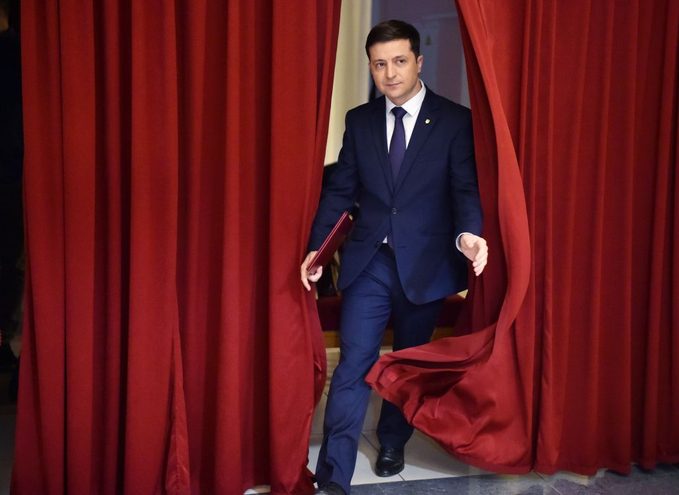
A life on stage set the scene for Zelensky’s heroism under the brightest international spotlight, says comedian and actor Paul Provenza, author of ¡Satiristas! and host of Showtime’s watercooler chat show The Green Room. Provenza has spent a lot of time analyzing the art and craft of political comedy, and he says Zelensky is a master of its most crucial component: making a human connection with the audience. “Zelensky has reached his audience through his art,” Provenza says. “He doesn’t have to change who he is as a politician because he came to power because of his art.”
Plus, the heart of Sluga Narodu—its frustration with corruption and hope for something better—speaks to everyone who believes their country can live up to its democratic ideals, whether in Ukraine, the United States or anywhere else. “Ukrainians aren’t ignorant; they don’t expect that the character he played will be their president. But they want the ethos that Zelensky put on TV to exist in their leader,” Provenza explains. “You watch him, and you see he’s authentic and genuine. This is not political posturing. He’s an artist who has embraced his truth: ‘I’m going to try my best for Ukraine.'”
Political comic Jimmy Tingle, a former 60 Minutes commentator who ran for Lieutenant Governor of Massachusetts in 2018, adds that Zelensky’s work in the political arena has always been rooted in his values and in a desire to serve. He points to the mission statement of Kvartal 95, Zelensky’s former comedy troupe: “Our ambitious objective is to make the world a better place, a kinder and more joyful place with help of those tools that we have, that is humor and creativity.”
“It speaks to his vision of the world, his commitment to something bigger than himself,” Tingle says. “Political comedy comes from that. You see the world in terms of right and wrong, you connect the dots, and then you have to make it palatable for the audience. And obviously, it has to be funny,” Tingle says. “Zelensky succeeded at all of that.”
Of course, he has evolved as new challenges have arisen. But Zelensky’s ability to be deeply honest and vulnerable—things that are essential in comedy—have helped him to shine during this crisis. “Watch his videos. He’s not blustering or saber-rattling. He’s looking into the camera, looking right at the audience, saying, ‘You can try to kill us all, but we’re going to fight. We’re not backing down. We’re not going anywhere,'” Provenza says. “That’s incredible courage, but it’s rife with vulnerability. And that’s what makes his message so effective. How can you watch that and not think, ‘We gotta help these people’?”
Why Zelensky’s messages are so effective
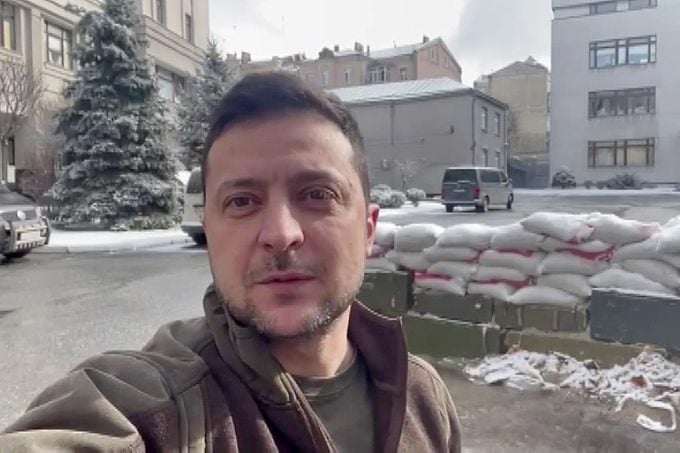
Zelensky is a skilled messenger, but his use of the media available to him makes his messages even more powerful. His self-shot cell phone videos have appeared on YouTube, Facebook, Twitter, TikTok and other social media, including Telegram, an encrypted messaging service used by many Russians. He has shown himself walking the streets of Kyiv, despite several Russian attempts to assassinate him, his eyes looking more tired and his beard growing longer with every new day of the war. His wife, Olena Zelenska, and their children have remained in Ukraine as well, with the First Lady making public appeals through official channels and social media to citizens of the world to help Ukraine. They are also inspiring the men and women of Ukraine to fight back.
The fact that both Zelensky and his wife are writers, directors and producers in the entertainment world is not lost on observers noting their media savvy. (Olena, a screenwriter, once wrote for her husband’s comedy troupe.)
“He’s been really good at using social media as outreach to the global community. Speaking directly into the camera shows confidence to Ukrainians, and it’s made him very sympathetic to Western audiences,” says Channell-Justice, likening the videos to Franklin D. Roosevelt’s radio broadcasts known as the Fireside Chats, which helped soothe Americans’ anxieties during the Great Depression and World War II. Even before the Russian invasion, she says, using modern communication outlets was a way for the Zelensky administration to deliver its message in its own unfiltered voice. “We’ve seen the whole Ukrainian government embrace a prominent social media presence,” Channell-Justice notes. “It’s an easy way to show Ukraine as a part of the Western world that it wants to be. This has been done very strategically.”
Tingle points to Zelensky’s address to the U.S. Congress, and particularly how he highlighted cultural touchstones that Americans hold dear, from the heroic leaders memorialized on Mount Rushmore, to the national resolve stoked by the attack on Pearl Harbor, to the national and global unity that emerged from the rubble left behind in the 9/11 terror attack. Zelensky similarly keyed his message to his audience when he addressed the British Parliament, referencing Winston Churchill’s iconic “We shall never surrender” and even giving a nod to Shakespeare’s Hamlet soliloquy, asking the question, “To be or not to be?” He later asked the Canadian Parliament to envision bombs falling on cities like Toronto, Edmonton and Vancouver.
“That’s connecting with the people. Not just the ones in Washington, but the ones watching at home,” Tingle says. “That’s the comedian’s art—knowing how to read the room.” And the video Zelensky shared as part of that address, showing heart-wrenching, uncensored images of the lives destroyed in this war, was the work of someone who knows how to tap into the audience’s emotions, Tingle adds.
Zelensky’s leadership in crisis sets a new standard
Libraries are full of books about Churchill and Roosevelt, praising them as great men who became even greater through the crucible of World War II. Churchill’s leadership, which provided the British people with encouragement and resolve to withstand German bombs that rained down for 57 consecutive nights, and Roosevelt’s steadfastness while fighting enemies across the Atlantic and the Pacific, are certainly worthy of the praise they garner. Facing global calamity, they rose to the occasion and proved their mettle.
But that kind of political leadership has rarely been seen since. After all, the last time a U.S. president took direct command of the military in action, George Washington put down the Whiskey Rebellion. Will Zelensky’s courage in the face of danger be the new standard by which politicians are measured in times of crisis?
“I don’t think Kyiv is still standing because Zelensky is still there,” says Channell-Justice. “But he has been a steadying presence for the Ukrainian people. He stayed when it would have been reasonable for him to leave. As long as he’s there, he’s preventing Putin from installing a puppet regime. That’s a powerful act.”
Provenza adds: “He keeps repeating the message: ‘We’re doing this until we don’t have to do this anymore. We’re not going anywhere, because we’re already home.’ He’s demonstrating the best of humanity while facing the worst of inhumanity.”
There is always a risk of making more of the current moment than it merits in the long reach of history. Economists and historians call this the “recency bias.” But Volker says that Zelensky’s leadership in standing up to Putin despite the threat to his life and the lives of his wife and children, staying in Ukraine under siege while his country fights a war for its very existence and acting as a proxy for democracy against imperial authoritarianism, will earn him a rightful place among the pantheon of great statesmen.
“Whether or not he survives the war, he becomes an irreplaceable fixture in Ukraine. He’s a ‘Founding Father’ figure,” Volker says. “He will have revered status in Ukraine and around the world, and I don’t think that will ever be diminished.”
Sources:
- Atlantic Council: “Time to rethink Ukraine’s fight against corruption”
- International Consortium of Investigative Journalists: “The Panama Papers: Exposing the Rogue Offshore Finance Industry”
- WION: “Approval ratings of Ukrainian President Volodymyr Zelensky fall amid Russia conflict”
- Paul Provenza, author of ¡Satiristas!: Comedians, Contrarians, Raconteurs & Vulgarians and host of Showtime’s The Green Room
- Jimmy Tingle, political comic
- Kvartal 95: “About Us”
- Evening Standard: “Olena Zelenska — from camera-shy comedy writer to Ukraine’s brave First Lady”
- Global News: “Ukraine’s Zelenskyy has survived multiple assassination attempts amid Russian war”
- President of Ukraine Official Website: “An Open Letter to the Global Media by Olena Zelenska”
